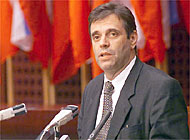
West urged not to impose democracy on Yugoslavia

An international conference held in the Swiss capital, Bern, has heard that there are no quick fixes for Yugoslavia, despite the move towards democracy following the overthrow of former president Slobodan Milosevic.
The conference, which wraps up on Wednesday, was organised by Switzerland’s East West forum, which regularly holds discussions and workshops aimed at achieving a greater understanding of the problems and issues faced by people in eastern Europe and the Balkans.
The Deputy Director of the Forum, Erich Gysling, said he hoped participants at the meeting would take away the message that radical change won’t come overnight in Yugoslavia.
“Patience is what is needed on the part of the west,” he told swissinfo. “And I do have my doubts over whether it is really wise for the west to pressurise the new regime in Belgrade to change things from one day to the next.”
This point was reinforced at the conference by Milorad Savicevic, president of the Yugoslav government’s committee for foreign economic relations.
“Our democracy is in its infancy,” he explained. “We’ve had 60 years without democracy, and now we have a lot to learn, and a lot of work to do to achieve a lasting democracy like those in the west.”
Other speakers too supported the need for patience. Jens Reuter, director of the Centre for Democracy in Thessaloniki, Greece, pointed out that lessons could be learned from his native Germany.
“In Germany, we know from our experience after the Second World War just how difficult the road to democracy can be,” said Reuter. “And in Germany we were occupied following our unconditional surrender, so in a way we had democracy forced upon us.
“Yugoslavia is trying to achieve democracy without the help of an occupying force, so it will have to undergo a ‘denazification’ process on its own.”
Reuter estimated that a stable economy and functioning democratic institutions will take 10 to 15 years to achieve in Yugoslavia, and he too urged the west not to push things.
In Switzerland, officials at the Swiss Development Corporation believe the task now is to develop aid projects, which will target priority areas in Yugoslavia.
“The country needs help to rebuild its infrastructure,’ said Remo Gautschi, deputy director of the SDC. “Especially in the areas of health, education and the environment.”
Switzerland has pledged SFr50 million ($30 million) in aid to Yugoslavia over the next six years. Gautschi said he believed that, despite being a small country, Switzerland was especially well placed to help.
“We remained in touch at certain levels even when Yugoslavia was isolated by the international community,” he said. “So we have good contacts, and the foundations have been laid to start good aid projects.”
But, as with other donor countries, Swiss aid to Yugoslavia is dependent on the new Yugoslav government’s continuing commitment to democracy.
Although international sanctions against Yugoslavia have been lifted, and Belgrade has been admitted to the Balkan Stability Pact, one of the main obstacles to unqualified international support for Yugoslavia is the reluctance of the new government in Belgrade to hand over Slobodan Milosevic to the International War Crimes Tribunal in the Hague.
Milorad Savicevic defended his government’s position by saying the political climate in Belgrade was not ripe for such a gesture.
“The international community has to decide what its priority is,” said Savicevic. “They have to recognise that economic recovery is a precondition for a stable democracy. So they have to decide what is better: to satisfy one international demand by delivering Milosevic to the Hague, or to help build democracy in Yugoslavia. I hope they will find a balanced solution.”
And Remo Gautschi agreed that, at the moment, the carrot approach to Yugoslavia was preferable to the stick.
“The country needs encouragement to continue in this positive way. The question of conditions should be seen in a broader light. Progress on the part of Yugoslavia is required for foreign support, but we should not link it to one specific issue.”
Nevertheless Savicevic stressed that his government was not presenting the international community with the tired threat, heard more and more often from new regimes in the east, that unless money was forthcoming from the west, the fledgling democracies would relapse into their bad old ways.
“It is absolutely clear that Yugoslavia has to re-establish a relation of trust with the international community. Without trust and truthfulness anything we do will be a façade. We have to prove that we are to be trusted, this is basic for all aspects of life.”
by Imogen Foulkes

In compliance with the JTI standards
More: SWI swissinfo.ch certified by the Journalism Trust Initiative





























You can find an overview of ongoing debates with our journalists here . Please join us!
If you want to start a conversation about a topic raised in this article or want to report factual errors, email us at english@swissinfo.ch.